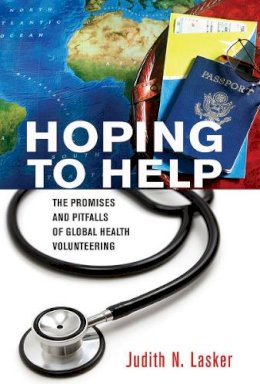
Hoping to Help: The Promises and Pitfalls of Global Health Volunteering
Judith N. Lasker
Overseas volunteering has exploded in numbers and interest in the last couple of decades. Every year, hundreds of thousands of people travel from wealthier to poorer countries to participate in short-term volunteer programs focused on health services. Churches, universities, nonprofit service organizations, profit-making "voluntourism" companies, hospitals, and large corporations all sponsor brief missions. Hoping to Help is the first book to offer a comprehensive assessment of global health volunteering, based on research into how it currently operates, its benefits and drawbacks, and how it might be organized to contribute most effectively. Given the enormous human and economic investment in these activities, it is essential to know more about them and to understand the advantages and disadvantages for host communities.
Most people assume that poor communities benefit from the goodwill and skills of the volunteers. Volunteer trips are widely advertised as a means to "give back" and "make a difference." In contrast, some claim that health volunteering is a new form of colonialism, designed to benefit the volunteers more than the host communities. Others focus on unethical practices and potential harm to the presumed "beneficiaries." Judith N. Lasker evaluates these opposing positions and relies on extensive research—interviews with host country staff members, sponsor organization leaders, and volunteers, a national survey of sponsors, and participant observation—to identify best and worst practices. She adds to the debate a focus on the benefits to the sponsoring organizations, benefits that can contribute to practices that are inconsistent with what host country staff identify as most likely to be useful for them and even with what may enhance the experience for volunteers. Hoping to Help illuminates the activities and goals of sponsoring organizations and compares dominant practices to the preferences of host country staff and to nine principles for most effective volunteer trips.
Product Details
About Judith N. Lasker
Reviews for Hoping to Help: The Promises and Pitfalls of Global Health Volunteering
The New York Times
This book is highly relevant to all healthcare professionals, particularly students considering an elective overseas, or dental professionals thinking about using a couple of weeks of annual leave to 'help others' abroad.... The publication is a triumph of social analysis and commentary, which rigorously appraises and summarises the existing body of evidence on the topic.... Overall it is a deeply compelling read that will give you plenty of food for thought, and perhaps change your plans, practice or even your life. I would wholeheartedly recommend it.
British Dental Journal
Hoping to Help makes an important contribution to studies of NGOs, civil society, philanthropy, and global health that both students and the wider volunteering community will enjoy and find easy to read.... Lasker provides prudent recommendations and guidelines for organizations and volunteers while also touching on deeper issues. Reading Hoping to Help led me to reflect on my past experience as a health volunteer and will encourage others to consider the ethics, opportunity costs, and colonialist relations of global health volunteering today.
Contemporary Sociology
Hoping to Help, by sociologist Judith N. Lasker, is a timely contribution to a growing literature that examines the unintended consequences of well-intentioned efforts to help, improve, or fix other people's problems. One of the strengths of Lasker's book is its eminent readability, teachability, and accessibility to those involved in or interested in medical volunteering abroad.
PoLAR
